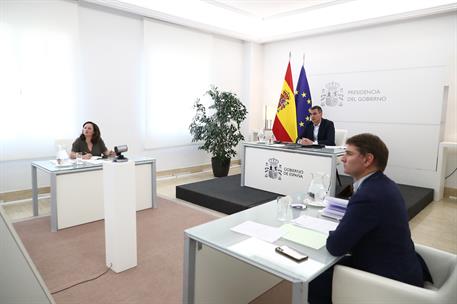First meeting of the SDG Stimulus Plan Leaders Group
Sánchez addresses the first meeting of the UN Leaders Group on international financing for development and reform of the global financial architecture
President's News - 2024.6.5
Pedro Sánchez takes part by videoconference in the first meeting of the Leaders Group of the Plan to Stimulate the Sustainable Development Goals | Pool Moncloa / Diego del Monte - 2024.6.5
Moncloa Palace, Madrid
The President of the Government of Spain, Pedro Sánchez, took part by videoconference in the first meeting of the Leaders Group of the Plan to Stimulate the Sustainable Development Goals (SDGs), at the invitation of the Secretary-General of the UN, António Guterres.
In 2022, the UN Secretary-General set out in his "SDG Stimulus Plan" his proposal for a profound reform of the international financial architecture to support the 2030 Agenda. To promote it, Guterres has formed a group composed of ten world leaders, all selected for their "relevance and ambition" in international debates, which the president has been invited to join, together with the presidents of France, Brazil, Kenya, Kenya, Canada and South Africa and the prime ministers of India, Italy, Jamaica and Barbados.
In addition to the president, the first meeting was attended by the Prime Minister of Jamaica, Andrew Holness, and the Prime Minister of Barbados, Mia Mottley. Other official representatives from Italy, France, Canada, Kenya, South Africa, India and Brazil also spoke.
The President of the Government of Spain showed his gratitude for the invitation and expressed Spain's commitment to promoting the ideas of the Stimulus Plan. In this regard, Sánchez pointed out the three essential points that must guide efforts to thrive in this challenge in the coming year: multiplying financing for development, having more robust financial safety nets and moving towards greater international tax cooperation.
The Leaders Group will work to make progress in these areas over the coming months. The 4th International Conference on Financing for Development, to be held in Spain in June 2025, will be a key milestone in advancing financing for sustainable development and redefining the international financial architecture.
Financing for development
Meeting the 2030 Agenda requires expanding the lending capacity of Multilateral Development Banks to finance sustainable development and global public goods in less developed countries, in particular in the fight against climate change.
To this must be added the increase in contributions from donor countries, a commitment made by law by the Government of Spain, which will allocate 0.7% of its Gross National Income to Official Development Assistance to meet the target set by the UN.
Spain plays a very active and committed role in the main international debate forums, which are key to promoting financing for sustainable development at a global level.
Financial safety nets
The president has defended the need for robust protection systems to respond to future crises more quickly and effectively. To support these efforts at the global level, Spain has already channelled 20% of the Special Drawing Rights (SDRs) allocated to it in 2021, and has committed to increase this SDR rechannelling to 50%.
Spain was the first country to contribute to the IMF's Resilience and Sustainability Fund, created to help vulnerable countries in their fight against climate change. The objective is now to multiply the impact of SDRs on the ground. In this regard, Spain recently signed a pioneering agreement with the World Bank and the IMF to channel an additional 1.5 billion SDRs (€1.8 billion) to the Resilience and Sustainability Fund to finance the joint activity of both institutions.
The president called for further work to optimise the use of these resources through innovative tools and to encourage financial institutions to work together to multiply the capacity to respond to the needs of the most vulnerable countries.
One of the objectives of the Stimulus Plan Leaders Group is to work on new instruments to provide relief to over-indebted countries while making progress on the SDGs. The aim is to make the international financial architecture more flexible and adapted to the needs of vulnerable indebted countries.
An example of this commitment is the application of contingency clauses, which Spain has already approved in its loans to adapt them to cases of health crises, but also food crises. The latter was an innovation promoted by the Government of Spain in the context of the food price crisis following the Russian invasion of Ukraine.
International Tax Cooperation
The president underlined the unique opportunity for increased international tax cooperation. Sound fiscal systems, which provide sufficient domestic own resources for countries' economic and social development, are essential to meet the 2030 Agenda. The president argued that to achieve this it is necessary to have progressive and redistributive fiscal policies.
Spain is fully involved in exploring innovative ideas to advance in this area, both within the framework of the UN and by exploring, together with other international partners and in different forums, the possibility of establishing global taxes on polluting economic activities, such as the production of fossil fuels, aviation and maritime transport, as well as a tax on the wealth of billionaires.
The president emphasised the relevance of creating these new global taxes in order to undertake the major investments needed to decarbonise the economy and achieve the SDGs.
Non official translation





